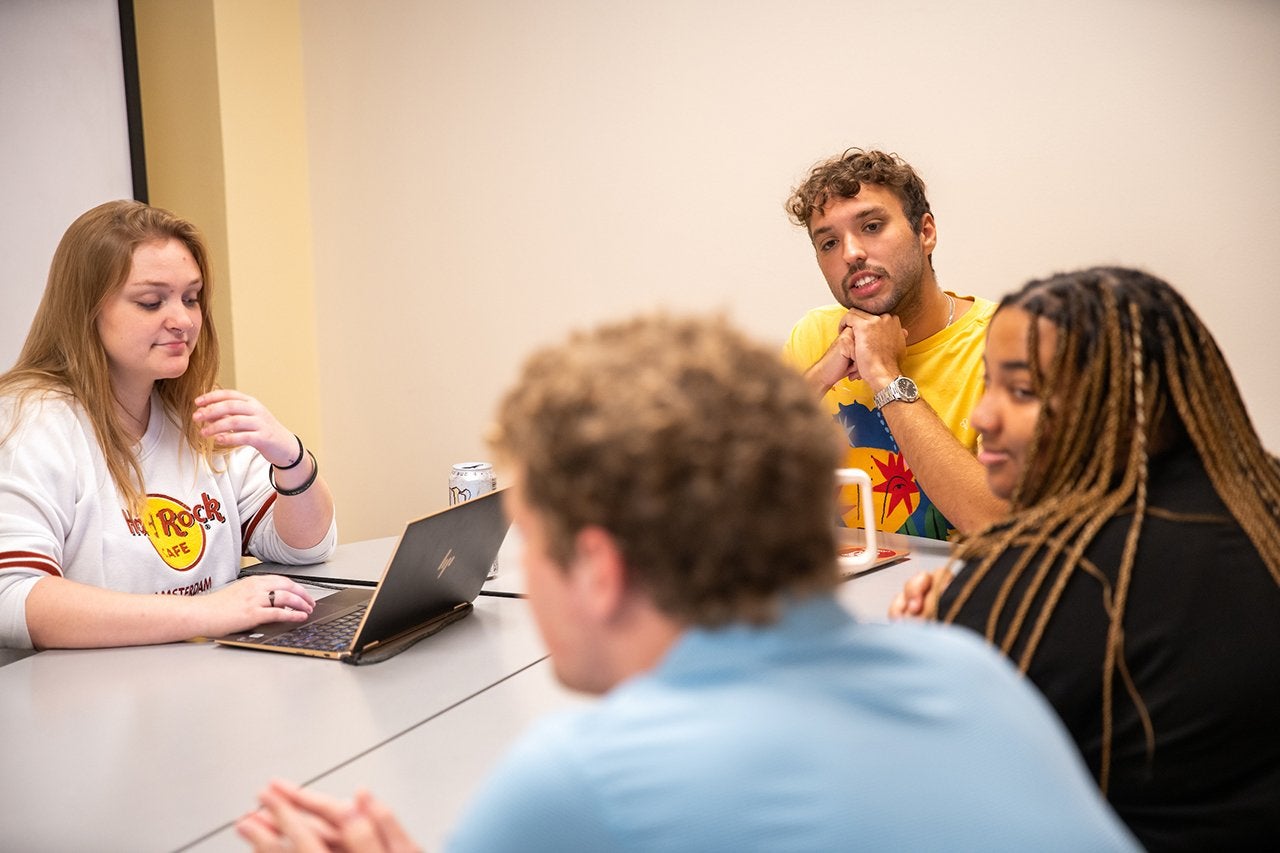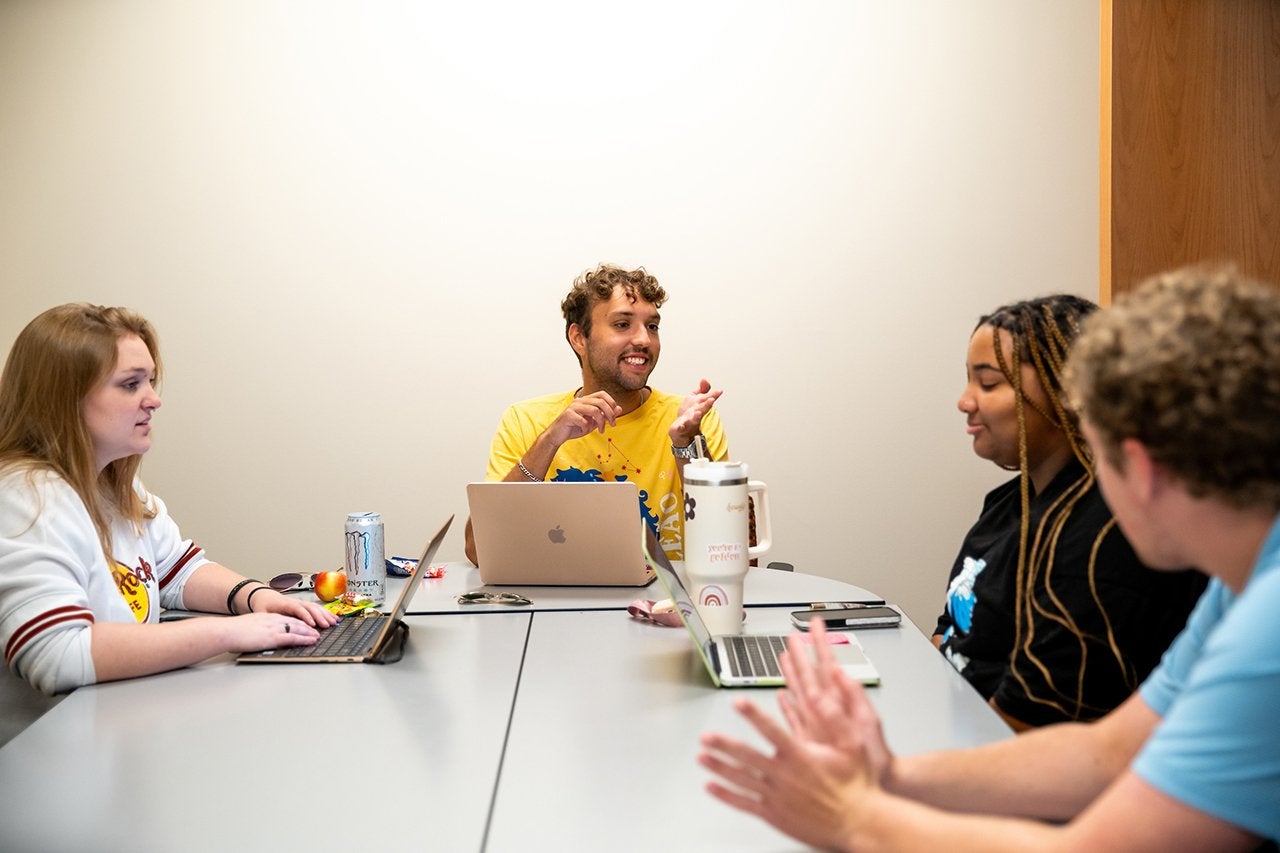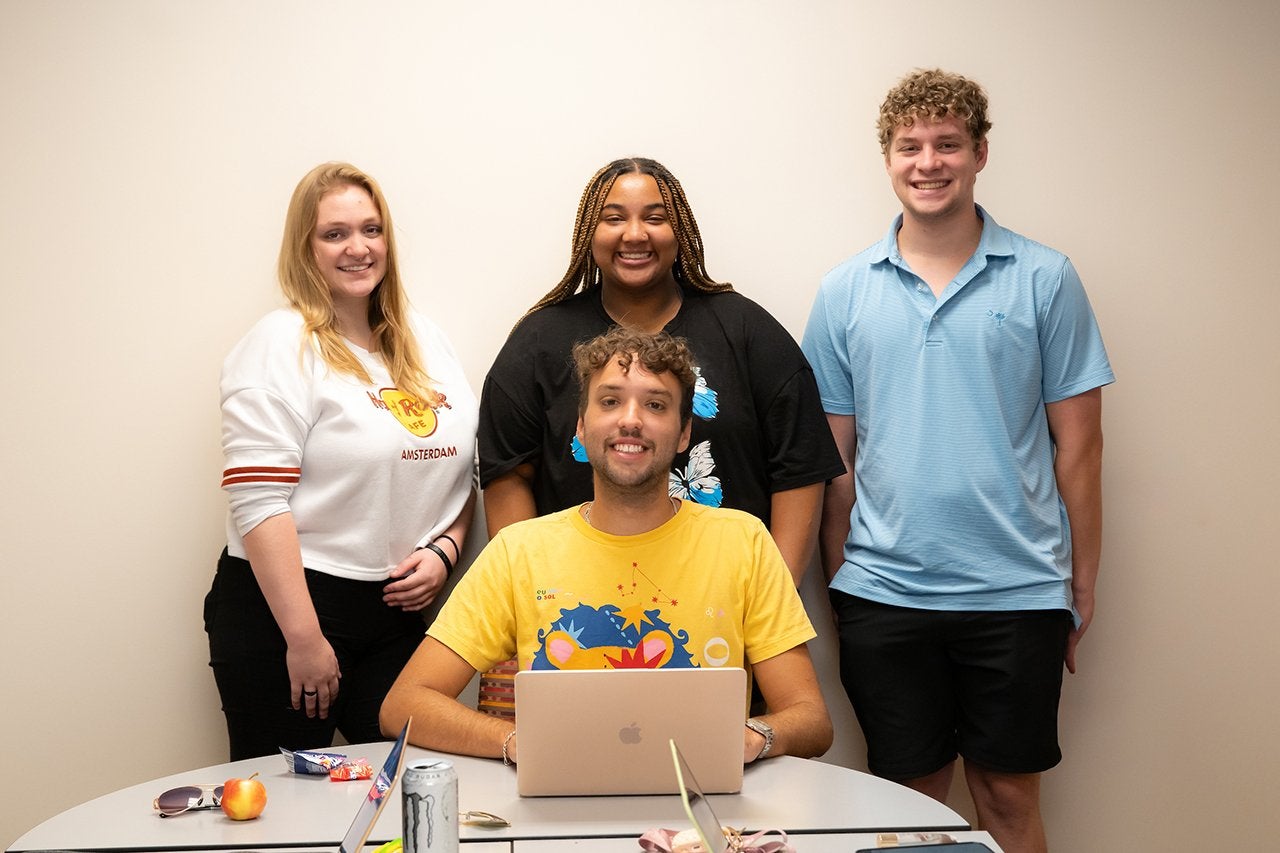Above (clockwise from top): First Year Experience peer facilitators JD Donmoyer, Kiara Williams, Reed Haneberg and Chelsie Turk gather weekly to support one another and address concerns and issues they’ve encountered in the first-year seminars that they teach.
At the College of Charleston, we build connections – between ideas and disciplines, between faculty and students, between our graduates and the real world. From the moment they step onto campus, we start connecting our students to the resources and opportunities available to them – whether right here on campus or across the globe.
But first – and perhaps more important – we build a connection with them. And one way we do that is through the First Year Experience.
“The First Year Experience program was created to provide opportunities for that kind of connection, that sense of belonging right off the bat. It’s the relationship that we are building, the personal connection,” says Jen Wright, psychology professor and director of the First Year Experience (FYE) at the College of Charleston. “It gives them a chance to build relationships with other students and to be guided by both a faculty member and a senior student or peer facilitator.”
The FYE is an academic program requiring new students to take a first-year seminar (FYSE), learning community (LC) or an Honors College FYE course during their first year. All FYSE and LC courses have an associated weekly synthesis seminar, which are led by faculty-nominated CofC students, called peer facilitators (PFs). PFs work closely with the faculty member, their students, their PF team leader and the Center for Excellence in Peer Education (CEPE), which manages the PF program and supervises the FYE PFs.

Peer facilitator Chelsie Turk talks with PF team leader JD Donmoyer in a weekly team meeting. (Photo by Catie Cleveland)
In addition to leading their weekly FYSE, each PF is responsible for creating a syllabus that contains curricular and co-curricular aspects associated with their faculty mentor’s course – and, throughout the semester, they hold office hours to work on lesson plans, prepare for classes and meet one-on-one with their students. They also are responsible for guiding their students on how to use on-campus resources, giving tips on how to be academically successful and addressing common transitional challenges that many students encounter their first year in college.
“When you’re a freshman in college, you’re often faced with new responsibilities, new experiences, and it can be excruciatingly lonely. This gives them someone their own age – with similar experiences – that they can talk to,” says FYE PF Gabriella Gibson, a senior sociology major. “I feel like my biggest role as a peer educator is to be a comfort and to connect with these students.”
“Peer facilitators are there to give advice, give resources, help with time management, cover health tips for when they’re stressed out,” says Chelsea Jacobs ’20, associate director of the CEPE, who also served as an FYE PF from the second semester of her freshman year at the College, all the way through graduation. “This gives students a built-in on-campus connection that they can turn to for support.”
And, the PFs have built-in support, too.
“Each PF is on a team led by senior student PFs which meets every Wednesday – kind of like a support group for getting advice and bringing up questions and problems they’re facing,” says Jennifer Smuniewski, director of the CEPE, noting that PFs can also turn to their faculty member for support. “Because they’re both working with the same cohort of students – PFs and faculty members consult one another regularly to coordinate not just their syllabi, but their approach to supporting the individual students. That way, when they see a student struggling, they can adjust their teaching style or work with the student to help them along. That’s what I love so much about the peer facilitators program: Faculty and peer educators are coming together to help our students.”
PFs receive training helps them navigate the students’ transition, the roles they play and the relationships they’ll have – along with teaching them about policies and student learning outcomes.
“This is where you’re able to learn about different learning styles,” says Jacobs. “You’re able to learn how to create those lesson plans, how to help students through the academic and social pressures of college, how to connect with students.”

Chelsea Jacobs ’20, associate director of the Center for Excellence in Peer Education and former FYE peer facilitator
But the learning doesn’t stop there for the PFs. In fact, that’s just the beginning.
“Because the faculty nominates a PF that they know well and trust,” says Jacobs, “the PFs already go into this with exceptional communication skills and leadership skills. But the relationship with the faculty member gives them a chance to gain even more confidence in those skills. It really sets them up for success, giving them confidence as a leader. And they grow as students, too. They learn to adjust the way they operate in their own courses according to the things they encourage their students to do.”
“You’re learning from them, but they are also learning from you, so it’s very much give and take,” says Gibson, a team leader who served as an FYE PF last year, too. “I’ve learned so much from just the small time I’ve been a part of it, whether it’s from person to person or just an overall class experience. I’m constantly learning.”
And the practical real-world experience that PFs are getting teaches them valuable lessons in time management, organization and communication, too.
“It’s the personal and professional development I have had as a PF – things like communication skills – that I think are most valuable,” says JD Donmoyer, a senior economics major who serves as an FYE peer facilitator team leader. “How you communicate with other people in a professional environment is important when you enter the job market. Knowing how to communicate effectively and professionally is a soft skill that a lot of jobs are looking for.”
Both Donmoyer and Gibson say they’ve also learned the art of problem solving.

Peer facilitator Kiara Williams talks to her team about challenges and milestones her students are facing. (Photo by Catie Cleveland)
“Because a lot of students come to me as a peer facilitator with problems that I have never had to deal with, or with unique problems, I have to troubleshoot to find the resources to help the student properly,” says Donmoyer. “That has really helped me in my problem-solving skills.”
“Problem solving is a huge part of it,” agrees Gibson. “So, it’s helped me understand the depth of human interaction as well as being OK not knowing the answer, figuring out what the answer is, being confident with myself and with others. And that’s been such a great takeaway through my college experience. I’ll be using the skills I’ve gained as a PF for the rest of my life.”
And it’s not just the skills that PFs take away from the experience. It’s a real sense of growth.
“You will be so amazed to see how your students allow you to grow. You will notice different things about yourself that you may need to work on, that you may need to improve on. And even in the midst of you growing and perfecting yourself as an individual, you’re able to assist students along the way,” says Jacobs. “It teaches you to be more empathetic, to really connect to people and create long-lasting relationships.”
Donmoyer agrees: “Talking to these students connects you to the College in different ways. You’re more invested, because these students are the future of the College of Charleston.”
“It makes you feel like you’re part of something bigger – like you belong to something greater,” adds Gibson. “It all comes back to building connections.”
That is, after all, what we do at the College of Charleston.






